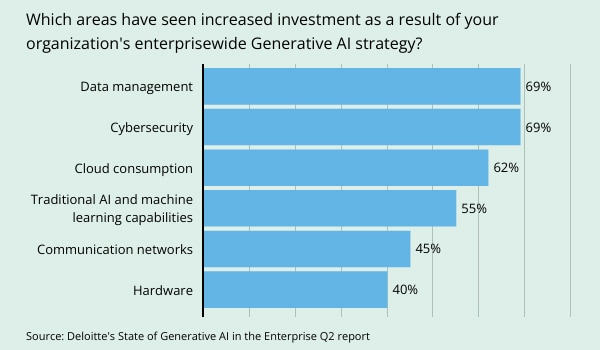Getting real
<b>New Q2 insights:</b> Explore updated findings from the Deloitte AI Institute's survey series tracking Generative AI adoption, wins, and challenges throughout 2024.
The State of Generative AI in the Enterprise

Quarter 2: Jan. – Feb. 2024
Scaling for tangible results
It’s time to go from pilots and proofs of concept to large-scale deployment. With new findings and insights from Q2, the second report in our The State of Generative AI in the Enterprise series, Getting Real About Generative AI, explores how organizations are getting down to the work of turning potential into reality.
View Q2 report
Quarter 1: Oct. – Dec. 2023
Now decides next
In our Q1 report, we found that expectations of Generative AI remain high, but many leaders are feeling pressure to quickly realize value while managing risks. The greatest areas of concern include governance, talent, and potential for economic inequality.
View Q1 report
Insights from the leading edge
of Generative AI adoption
The defining time for Generative AI is now. How we train, apply, govern and work with Generative AI will determine its impact. The State of Generative AI in the Enterprise is a survey series tracking trends in use cases, sentiment, adoption, and challenges throughout 2024. Explore findings from the past two quarters now, and stay tuned for what’s next.
Subscribe for updatesExpecting benefits
Improved efficiency and productivity remain the most anticipated benefits among organizations adopting Generative AI. As organizations continue to seek ROI, measuring value and communicating it to the wider enterprise will be key.
Realizing benefits
As with many emerging technologies, it takes time for reality to catch up with expectations. So far, only 27% of the 56% of respondents expecting large efficiency gains are seeing the benefit. Meanwhile, fewer respondents were anticipating a boost to innovation, but a third are realizing it.
Moving faster, expanding access
Organizations with the highest levels of expertise appear to be scaling quickly. While many respondents report providing Generative AI access to only a limited portion of their workforce, that isn't true of more adept organizations—they are making tools widely available and using them across more functions.
Reinvesting gains
Once organizations scale their AI initiatives, where are they looking to reinvest efficiency gains? Organizations are planning to capture value from both sides of the business— by driving innovation and improving operations.
Rising confidence
For AI-savvy organizations, concerns around trust and risk aren’t slowing adoption. In fact, those surveyed were likely to say that access to Generative AI is actually helping to cultivate trust in all forms of AI—and that they can balance moving fast with managing risk.
Establishing trust
Organizational trust is essential for successful scaling. Yet only 36% say they’re measuring trust and engagement. Likewise, less than half are focused on processes to create trust in Generative AI to a large extent. Organizations need to ramp up efforts around transparency, familiarity, responsibility, and practical guardrails.
Adjusting talent strategy
Organizations point to a lack of technical talent and skills as the number-one barrier holding them back from achieving their AI goals at scale. Most anticipate evolving their talent strategies within the next two years to develop their GenAI-powered workforce.
Pursuing new people and skills
Almost 40% of organizations say they are looking to increase headcount over the next 12 months to support their Generative AI initiatives. A mix of both technical and human-centered skills will become more valuable as organizations progress on their Generative AI journeys.
Stay future-ready. Discover how Generative AI adoption
is evolving in our Q2 report.
View Q2 report
Generative AI adoption by function
GenAI-savvy organizations are implementing tools and capabilities across teams at higher rates. Explore how GenAI is being used across the enterprise today.
IT and cybersecurity
Examples include chatbots, code generation, threat simulations, and failure scenarios for predictive maintenance.
Marketing, sales, and customer service
Examples include personalized ad content, sales forecasts based on historical data and market trends, and virtual assistants.
Product development and R&D
Examples include concepting, the creation of new product designs, and simulated prototypes in various environments.
Strategy and operations
Examples include simulating business scenarios to aid in strategic planning and optimizing processes through efficient workflows.
Finance
Examples include generating financial forecasts, creating risk assessments, and automating report generation.
Supply chain and manufacturing
Examples include simulating the performance of processes to improve efficiency and predicting demand, supply, and logistics scenarios.
Generative AI insights and solutions from across Deloitte
Gen AI investment opportunities center on data, cybersecurity, and cloud, Deloitte survey finds
Analysis of data from the second quarterly survey in of the State of Generative AI in the Enterprise series found that GenAI’s near- and long-term success hinges on continued co-investment in the wider technology ecosystem.
Learn more
About this report
Now decides next: The state of generative AI in the enterprise is a quarterly report series by the Deloitte AI Institute exploring how actions taken now will guide Gen AI adoption and impact.
Methodology
To help leaders in business, technology and the public sector track the rapid pace of generative AI change and adoption within the enterprise, Deloitte is conducting a series of quarterly pulse surveys. The first wave of our survey was fielded to more than 2,800 Director to C-suite level respondents across six industries and 16 countries between October 12 and December 5, 2023.
Looking for generative AI insight tailored to your business? Let's talk.
Source: Deloitte’s State of Generative AI in the Enterprise Q2 report

